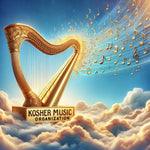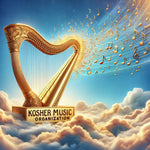Simply put, kosher music is music that awakens and empowers the mind (Ruchniyus/Neshama) which then takes control over the body (Gashmiyus/Guf). Non kosher, ("treif") music is music that awakens and empowers the body which then takes control over the mind. (עיין חובות הלבבות שער הפרישות פרק ב)
Kosher music does not have to be Jewish. Even music that comes from non Jewish sources is fine to listen to - provided that it is kosher. This means that it evokes the power of the mind over the body as well as that the words are proper.
Often with the non Jewish music of yesteryear, the tunes were kosher, but the words were not. As such, several non Jewish tunes were "kashered" and brought into Klal Yisrael. This was permitted because the tunes themselves were kosher and the only problem was with the words. Once the words were changed, the song became kosher.
The problem is the other way around. When the tune is treif, meaning that it evokes the power of the body over the mind, (or as mentioned above the Gashmiyus over the Ruchniyus) then no matter how good and holy the words are, the song will always remain treif.
Let's explain this with a mashal. A cow is a kosher animal. If a persons shechts it according to halacha, it is kosher. If he kills it without shechita, or even if he shechts it, but not according to halacha, it is not kosher. In both these cases, the cow itself is kosher, but the processing method is the deciding factor if it is kosher or not.
A chazir (pig) is a non kosher animal. If one were to shecht it, it would still not become kosher. This is because a chazir is inherently treif - a non kosher animal. The same is true with music. A tune that evokes the power of the mind over the body is a kosher tune. It can however, be guided into one of two directions. If one puts good words to it, it will be kosher. If one puts bad words to it, it will be treif. However, when it comes to a tune that evokes the power of the body over the mind, the tune itself is inherently treif. No matter how good the words are, the tune will never become kosher.
Accordingly, kosher music can come either from Jews or non Jews. So too, treif music can come either from Jews or from non Jews. If Jews copy treif styles of music from foreign religions or foreign cultures, such songs are inherently treif. No matter how good the words are, such songs cannot become kosher.
Adding Hebrew words to a treif song is the same as shechting a chazir.
Therefore, the term "Jewish" music is not the proper way to describe music of positive influence. Rather, "Kosher" music would be the correct term to describe such music.
There is however another level. Even after music is kosher, if the tune of the song explains the words, meaning that the tune is saying a p'shat in the words, then this adds Emes - truth, to the song. Not only is it kosher, but it is now also Emes as well. If the tune does not explain the words, then the song is Sheker - false.
In addition to Emes and Sheker, there are several levels of kedusha that can go into a song. Most of it depends on the level - the Madreiga - of the composer when he composed it. The higher the Madreiga of the composer at the given moment, the more Kedusha the song will have.
It is therefore possible for some songs to be super Kadosh and others to be less Kadosh, even when made by the same composer. This is because a composer is a human being and as such, he has ups and downs. The songs that he composes while on a very high Madreiga will therefore be much more powerful and meaningful than those he composed while on a lower Madreiga. They will all be kosher, but some will have more Kedusha than others.
An in depth explanation of all this and much more, together with hundreds of audio and video examples, will be demonstrated in our soon to come presentation "The Art of Music" - Using music to achieve the greatest heights and be saved from falling to the lowest depths. There are also advanced shiurim for parents and Rebbeim being formulated. These shiurim will explain in depth both the positive and negative sides of music. Please check back or sign up for our monthly newsletter to receive updates when these shiurim will become available.




